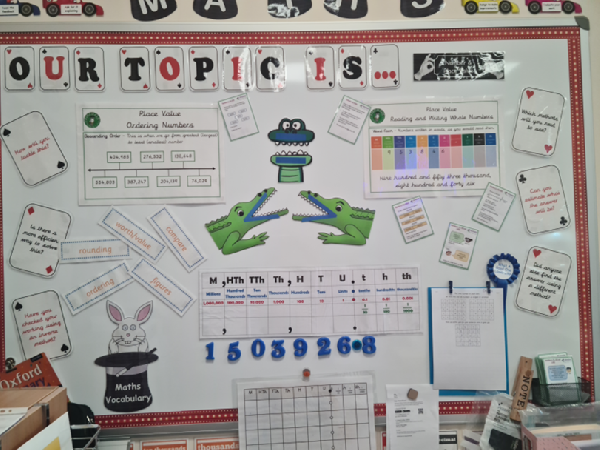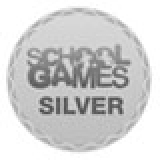Maths
Subject Leader: Miss Clarkson with Miss Skitt & Mrs Garlick
Mathematics at Airedale Junior School aims to equip children with a uniquely powerful set of tools to understand and change the world. These tools include logical reasoning, problem solving skills, mastery skills and the ability to think in abstract ways. Mathematics is important in everyday life. It is integral to all aspects and with this in mind we endeavour to ensure that our children develop a positive and enthusiastic attitude towards Mathematics that will stay with them.
Mathematics consists of a whole network of concepts and relationships, which children learn to use to communicate and to tackle a range of practical tasks and real life problems. At Airedale Junior School we aim to ensure that all of our children become independent learners, who can apply logical reasoning, problem solving skills and the ability to think in abstract ways.
The Primary Objectives of teaching Mathematics at Airedale Junior School are to:
- Develop efficient mental strategies to perform calculations with increasing precision
- Develop efficient written methods and perform calculations accurately
- To ensure children have a good understanding of place and value and the number system
- For children to make connections between the four calculation strategies
- To forge links between the calculation strategies, fractions, decimals, percentages and ratio
- Solve a wide range of problems by applying mathematics with increasing sophistication, including breaking down problems into a series of simpler steps and persevering in seeking solutions.
- Develop mathematical reasoning by following a line of enquiry, conjecturing relationships and generalisations, and developing an argument, justification or proof using mathematical language
- Use a range of manipulatives and pictorial resources to develop conceptual understanding and the ability to recall and apply knowledge rapidly and accurately.
- Use mathematical vocabulary correctly and confidently
The school ethos of Ambition, Bravery and Respect is woven throughout the Mathematics curriculum offer and ensures that children are equipped to take their learning into adulthood. Our TRUST values of Ambition, Bravery and Respect underpin our school ethos. In each lesson, children complete a challenge related to the concepts that they are learning, in order for teachers to assess starting points. Our children enjoy this and are ambitious in their attempts to succeed and improve in order to reach mastery.
Our maths curriculum is designed to challenge our pupils and open their minds to a range of differing possibilities when approaching mathematical concepts. Where possible, we link these to real life problems so that our children can see how maths will support them in the wider world. Much of maths is linked to practical activities, where we encourage our children to use resources in order for children to visualise the concepts they are learning. Children are encouraged to be brave when solving problems and we encourage them to understand that sometimes, there is more than one possible solution to a problem.
Oracy and communication are fundamental skills that we believe equip our children to be life-long learners. This is promoted in maths through the use of a variety of mathematical vocabulary, investigations and use of carefully planned speaking and listening activities in order to develop mathematical enquiry and promote inquisitive conversations. The vocabulary in maths is very much dependent on prior knowledge of mathematical concepts so we have specifically chosen progressive vocabulary which we expect children to know, understand and apply in context.
Being independent and fostering a love for learning is crucial in our school. This is promoted in maths daily through the lessons planned, where we encourage children to have enquiring minds through their application of skills.
Through the use of mastery activities, children further develop, apply and deepen their knowledge and understanding which gives their learning a sense of purpose.

How do we ensure progression of knowledge and skills?
At Airedale Junior School, we deliver a spiralled progressive maths curriculum, which is used to support planning, to ensure sequenced and appropriate content for specific year groups. Teachers are clear on the learning and expectations for each year group, as this has been mapped out so that children are building on prior knowledge and skills each term and each year. Whenever possible, we teach through a focused calculation ensuring that the skills are linked closely in order to consolidate, embed and revisit learning, make connections and develop a greater depth of understanding within the subject.
Maths Calculation Policy Document
How is the subject taught?
The Mathematics curriculum is cumulative, we do not use a set scheme to aid our teaching. This gives our children the opportunity to ‘master maths’; through working on individual need, next steps teaching and revisiting and consolidating previous learning throughout the school year. Though this method our children develop mathematical fluency and conceptual understanding.
Within each unit of work and daily lessons, class teachers carefully plan the specific outcomes for their year group and class, this is based upon age appropriate knowledge and skills, as well as the needs of the cohort or individuals within it.
All children take part in a daily mathematics lesson following a sequenced structure. This provides pace to the lessons as well as opportunities for feedback and assessment. Great emphasis is placed on reasoning and problem-solving. Children are expected to explain their mathematical thinking using appropriate language throughout the lesson. Children are encouraged to apply their increasing mathematical knowledge at all stages of the lesson.
In every lesson a mental or calculation starter is used to build up key skills and accuracy, followed by a recap of prior learning, which the children refer to as the ‘pit’. Key mathematical vocabulary is then reinforced or introduced as a further opportunity to ensure that children have learnt and remembered what has previously been taught. Modelling is then used by class teachers to clarify expectations, before children are then given numerous opportunities to consolidate and build upon their skills through fluency practise, before progressing to reasoning and problem solving.
Through every Mathematics lesson pupils will be taught:
Conceptual Understanding - Children deepen their understanding by representing concepts using equipment e.g. counters, base 10, bead strings to gain solid understanding of mathematical concepts, making links with new learning and developing analytical thinking for problem solving. This approach then progresses to pictorial representation, essentially a drawing or picture which still provides support to access maths learning. Once children have a real understanding a more abstract approach is used, the using numbers, words, symbols and formal written methods. They make connections between different representations and consider what different representations stress and ignore.
Language and Communication - Children deepen their understanding by explaining, creating problems, justifying and proving using mathematical language. This acts as a scaffold for their thinking and deepening their understanding further.
Mathematical Thinking - Children deepen their understanding by giving an example, by sorting or comparing, or by looking for patterns and rules in the representations they are exploring problems with.
If child has a meaningful understanding of the maths they are learning, they will be able to represent it in different ways, use mathematical language to communicate related ideas and think mathematically with the concept. This will enable them to apply their understanding to a new problem in an unfamiliar situation.
Look at what we have been up to in our lessons...
In accordance with the National Curriculum Key Stage 2 children will be taught about:
- Number – Number and Place Value
- Number – Addition and Subtraction
- Number – Multiplication and Division
- Number – Fractions, Decimals and Percentages
- Ratio and Proportion
- Algebra
- Measurement
- Geometry – Properties of Shapes
- Geometry – Position and Direction
- Statistics
How do we know that our children are making progress?
At Airedale Junior School the content of the mathematics curriculum is chosen to ensure coverage of the knowledge, skills and expectations, as set out in the National Curriculum programmes of study. Each year group has in place a knowledge coverage document, which is used for planning to ensure sequenced and appropriate content for specific year groups, as well as building up skills and knowledge
Ongoing assessments of the children’s knowledge and skills are made by the class teacher using AFL strategies, formative assessments and through self and peer assessment tools. Misconceptions are addressed and next steps carefully planned. At the end of a term of spiralled teaching, our children complete summative assessments which is a written test in line with the National Curriculum which is designed to show areas of success and next steps in learning.
The summative assessment is used to plan appropriate next steps for their future learning, as well as provide an overview of learning within a subject area cross the whole school.
What wider opportunities are provided for our children?
Teachers plan strategically to take advantage of opportunities to make cross-curricular links. They will plan for children to practise and apply the skills, knowledge and understanding acquired through Mathematic lessons to other areas of the curriculum. They will also use their long term planning to make the best use of fitting in appropriate units to coincide with other curriculum plans. Special visitors are booked to enrich the curriculum in an interesting way.
Application of Mathematics across the curriculum is ongoing and Mathematics subject leaders monitor this termly.
Mental Maths:
At Airedale Junior Schoo w have created a progressive mental maths skills challenge for children to work through which will improve mental calulation skills. Here are the links below to our challenge which children work through at their own pace from Y3 onwards.
Mathematics: Further Information & Links:








